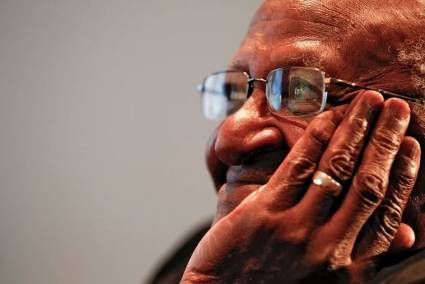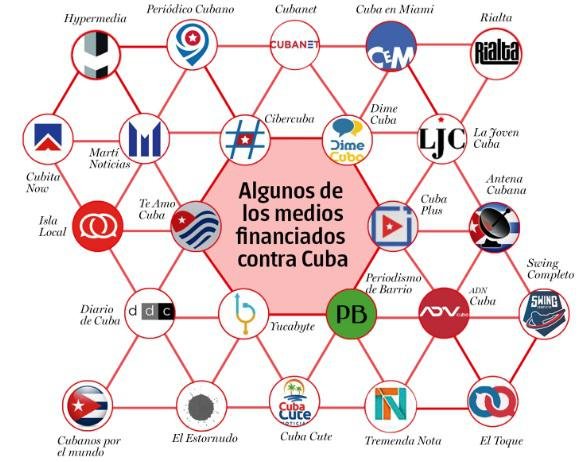December 26, 2021 2
Desmond Tutu Dies at age 90

Desmond Tutu, South African archbishop and Nobel Peace Prize laureate, dies at the age of 90
For his fight against the brutal racist oppression of apartheid, Tutu is considered one of the key figures in South Africa’s contemporary history
Author:

Juventud Rebelde |digital@juventudrebelde.cu
Translated and edited by Walter Lippmann for CubaNews.

South African Archbishop Emeritus Desmond Tutu. Autor: EFE Publicado: 26/12/2021 | 09:36 am
This Sunday, at the age of 90, died South African Archbishop Emeritus Desmond Tutu, 1984 Nobel Peace Prize winner for his activism against the Apartheid racist segregation regime, in Cape Town, said in a statement issued by the South African government, the country’s president, Cyril Ramaphosa, who sent his condolences to the Tutu family.
“The death of Archbishop Emeritus Desmond Tutu is another chapter of loss in our nation’s farewell to a generation of outstanding South Africans who bequeathed us a liberated South Africa,” the president said in the text.
The president described Tutu as a “peerless patriot” and a “man of extraordinary intellect” who maintained his integrity in the fight against the “forces of apartheid.”
Even in a democracy, Ramaphosa stressed, Tutu maintained the “vigor” and “vigilance” of leadership to hold institutions accountable.
“On behalf of the Anglican Church of Southern Africa, the entire faith community and, dare I say, on behalf of millions (of people) across South Africa, Africa and the world, I send our deepest condolences to his wife, Nomalizo Leah, his son, Trevor Tamsanqa, and his daughters, Thandeka, Nontombi and Mpho,” Makgoba said in a statement.
The voice of the voiceless
“Apartheid, separate development or whatever it is called, is evil (…) It is anti-Christian and unbiblical. If anyone proves me otherwise, I will burn my bible and cease to be a Christian,” Tutu protested to apartheid officials in 1982.
For his tireless struggle, Tutu received the Nobel Peace Prize in 1984, two years before he became the first black head of the Anglican Archbishopric of Cape Town (southwest).
For his struggle against the brutal racist oppression of apartheid, Tutu is considered one of the key figures in contemporary South African history.
:quality(85)/cloudfront-us-east-1.images.arcpublishing.com/infobae/4QNT2SIPIYYZYBCKC7XHJHQDJ4.jpg)
At the World Conference Against Racism (WCAR), September 5, 2001. Photo: Reuters
He was at the helm until 1996, when apartheid was dismantled and South Africa became a democracy led by Mandela.
As president, Madiba – Mandela’s local nickname, who described the archbishop as “the voice of the voiceless” – gave Tutu the difficult task of chairing the Truth and Reconciliation Commission, a body charged with bringing to light the atrocities committed during apartheid.
:quality(85)/cloudfront-us-east-1.images.arcpublishing.com/infobae/QOTNWOB6UVDA5G73FFEL5VNE7Q.jpg)
Desmond Tutu with Mandela. Photo taken from the Internet
Tutu and Mandela, in fact, had resided on the same street in Soweto, which is today one of Johannesburg’s major tourist attractions, to the pride of South Africans, who boast that no other country has a street with two Nobel Peace Laureates.
His career has been marked by a constant defense of human rights, something that led him to dissociate himself on numerous occasions from the church hierarchy to openly defend positions such as gay rights or euthanasia.
In recent years he had stayed away from public life due to his advanced age and the health problems he had been suffering from for years, including prostate cancer.
His last public appearance had been in a few brief video images broadcast on his 90th birthday (last October 7), an anniversary that his foundation celebrated with a virtual conference in which participated, among others, the highest Tibetan spiritual leader, the Dalai Lama, the Mozambican activist and widow of Nelson Mandela Graça Machel or the former Irish president Mary Robinson.
(With information from EFE)
Freedom, Inc.

Freedom, Inc.
They have commodified the symbol of freedom so much that they don’t even know what it means anymore. But the worst thing is not that. The worst thing is that, consciously or unconsciously, this commodified counterrevolution has become one more “pillar” of socialism in Cuba. Because if the Revolution falls… what the hell are they going to live on?
Translated and edited by Walter Lippmann for CubaNews.

Image: Granma
A good capitalist finds everything a profitable business. It is the maxim of the successful bourgeois: make profit. With this liberal logic, let us not doubt it, human civilization has advanced considerably, although this advance has not been homogeneous. It cannot be questioned that leaving behind slavery or vassalage were substantial improvements for humanity as a whole, although there continued to exist (logically) oppressed and oppressors, people who had too little and people who had too much. And people who, even though they had too much, wanted even more.
The champions of capitalism have never ceased in their eagerness to accumulate property and wealth, wrapped in an ideological plot in which they feel themselves owners of land, resources, real estate, other people’s work… But finding as a limit not only the development of the productive forces themselves, but also nature and the real world itself, they sought to make money from symbols. Profiting from imaginaries was the new horizon of mercantile liberalism.
Today, when people in many countries celebrate Christmas, we cannot overlook the fact that December 25 is alleged to be the date of the birth of Jesus, a man who died crucified for advocating a different ideal for humanity and society, based on values such as mercy, austerity and love. However, the date has become an occasion to buy gifts, spend money on frivolities and reward consumerism. The symbolic-religious has become symbolic-mercantile.
It is not surprising then that the staunchest detractors of socialism practice the same, while promoting the capitalist system as the highest stage of social development. And finding that there is a solvent demand to finance their anti-communist crusade, they turned into profit what once, perhaps, was an honest, though misguided, commitment. It is hard to be honest when you pay obeisance to Don Money.
Battling for federal funds or for sums that are “laundered” through third parties, which may be foundations or other organizations, the champions of capitalist restoration in Cuba spare no effort to show themselves as “the best bet”. They have made the symbol of freedom their most profitable business.
According to the current, they mutate their discourse, to show themselves to be tougher or more peaceful. He who pays, rules: they only offer a service. With YouTube channels, where they talk about freedom, justice and the American way, while they sell you the best hamburger in Miami or the best beauty salon in Florida. Then there are sites that talk about national emancipation and transparency while they receive money from abroad through PayPal, with no declared patron. Then we have the counterrevolution has made preaching against the Cuban government a very attractive option from a financial point of view.
The same people who criticize so much the inequalities that we have not eradicated in our country, or who live by publishing any excess or luxury that a relative of a Cuban leader has, make thousands and even millions of dollars, with which they buy apartments, houses, travel around the world, are published in the most famous sites and media, receive prizes and gifts for the fact of continuing to breathe (before, during or after suffering the terrible Castro-communist dictatorship)…. Everything is possible if you belong to that financial and media corporation that has found an inexhaustible vein of gold in opposing the Revolution.
Meanwhile, there are useful fools who, poisoned by their hate speech, who continue contributing money, time and effort to a sterile cause. They are those who were deceived by a character who said he was going to come to Cuba from Spain, to free us from the “tyranny” of Diaz-Canel, with the infallible strategy of freezing the funds of the “dictatorship” abroad. Or those who believed that a certain playwright would fight to the last consequences because he believed in what he preached, and that he was not just another one of those who seek to facilitate a visa and a comfortable stay in Europe or the U.S. They are those who applaud, forgetful, any initiative, however puerile and inconsequential it may be.
The gesture is more important than anything else. That is why we are not alarmed when we read about the proposal to create a “Free Republic of Cuba”, nothing more and nothing less than at the naval base in Guantanamo, a territory illegally occupied by a foreign power. They have so commodified the symbol of freedom that they no longer even know what it means. But the worst thing is not that. The worst thing is that, consciously or unconsciously, this commodified counterrevolution has become one more “pillar” of socialism in Cuba. Because if the Revolution falls… what the hell are they going to live on?

You must be logged in to post a comment.